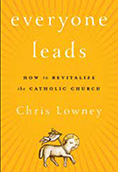REVIEWED BY FR. DENNIS HOLTSCHNEIDER, CM, EdD
 Everyone Leads: How to Revitalize the Catholic Church
Everyone Leads: How to Revitalize the Catholic Church
By Chris Lowney Rowman & Littlefield, 192 pages, $24.95
It often helps to have lived in two cultures, and Chris Lowney once again has put his personal experience to good purpose in his newest book, Everyone Leads: How to Revitalize the Catholic Church. A former seminarian and current board chair of Catholic Health Initiatives, Lowney had a successful career at J.P. Morgan & Co., rising to managing partner. He combines sophisticated knowledge and love for the church with the expertise of a corporate consultant, one burnishing the other.
That combination was on full display in his previous works, Pope Francis: Why He Leads the Way He Leads and the best-selling book about the Jesuits, Heroic Leadership: Best Practices from a 450-Year-Old Company That Changed the World. In Everyone Leads, Lowney seeks to offer his best consulting advice to a church that could benefit greatly from it, though he is not necessarily addressing church leadership. Primarily, the book is speaking to the membership, from its cradle-to-grave, pew-sitting adherents to its parish volunteers and leaders, its pastors, and those working within its myriad educational, health and social ministries. Bishops receive a share of "recommendations" at the conclusion of each chapter, but Lowney is convinced that revitalization is possible from within the ranks, and he sets out to show how.
He begins by startling the reader with the seriousness of the U.S. church's present situation and trajectory. He's quite right to suggest that we are just a generation away from the church becoming a shadow of its former self, and, in fact, that this present generation of parents will be unlikely to pass their faith to their children.
Readers will not be surprised by the trends, but they may be sobered by the combination of facts and the degree to which they already have had great effect. The purpose of this bracing appraisal is to move us toward action, and, as such, the entire book becomes a call.
Good consultants begin by creating space for fresh and hopeful thinking. Lowney asks us to imagine ourselves as the early church, reminding us that Jesus did not set out to create a church that happens to have a mission; he created a mission around which a church was built. Lowney also points to the resources the church now has at hand, including a highly educated and highly placed membership, unprecedented communication tools, the expertise and resources of thousands of schools, hospitals and social service centers, and examples of parish priests and lay leaders who, in recent years, have done some extraordinary things that have borne great fruit.
Chapter by chapter, he sketches how the church might become more entrepreneurial; how it might use the most basic of accountability structures to drive change; how focusing our energies particularly on the poor and marginalized would revitalize every corner of the church; how we might refocus especially upon meeting the spiritual needs that ex-Catholics say they did not find; and how making our churches feel like home to those who have not visited in a long time. Doing all this, he reasons, would have a powerful effect on changing today's trajectories.
The heart of Lowney's hope, though, finds expression in his anecdote about a group of World War I soldiers caught in a snowstorm during a scouting mission in the Alps. Estimating their coordinates, they used their map to find a way off the mountain, heading in the direction that seemed best and adjusting the route when they ran into obstacles and dead ends. The soldiers eventually got to safety — and that's when they discovered their map wasn't for the Alps, it was for the Pyrenees.
Lowney's point: Good strategy lies not in the right ideas at the outset, but in getting started, trying something, and adjusting along the way. His hope for the church lies precisely in stirring Catholics to build their local church, to take ideas from one another, to try new things and simply to adjust along the way.
"I set out to write a book about revitalizing the institutional church, but the book that emerged is as much about embracing our individual calling," Lowney says at the beginning of the third chapter, "Imagining the Church's New Culture of Leadership."
"Put plainly — every one of us must show more leadership. . . . if a critical mass of us can lead as we are capable, our church will flourish, even if (God forbid), we get lousy leadership from those in hierarchical authority."
Leadership matters, of course, and there remains room for a book on how the U.S. bishops could more effectively use their bishops' conference to fundamentally revitalize the church. It is a structure deeply needing the kind of consulting expertise that Lowney, and others like him in the church, could provide. In the end, however, the book's encouragement for the rest of us deserves both a broad readership and individuals who will take it upon themselves to see that it is read broadly. Ideas, as well as churches, need champions, and this book deserves its champions.
FR. DENNIS HOLTSCHNEIDER, CM, is executive vice president and chief operations officer of Ascension, St. Louis.